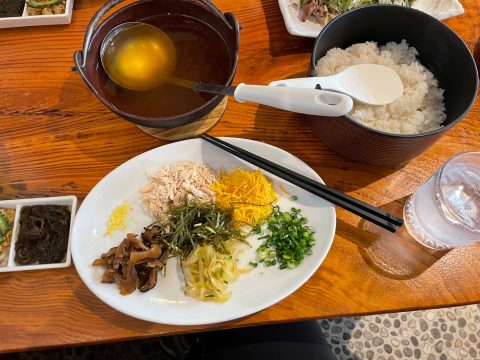Daizu (大豆)
JAPANESE FOODS
28.07.2024

Recently, my children asked me how soy sauce is made. From that one question, the conversation has expanded to “what is Daizu?”. As I talked with my children, I realized that we’ve talked about products made from Daizu, but never talked about Daizu itself. So, let’s dive into the details of Daizu today.

Daizu Through the Ages
Daizu, also known as soybeans, is an important crop in Japan and is widely used in Japanese cuisine. It is grown in various regions of Japan, with the majority of production occurring in the northern and western parts of the country. Daizu has a long history in Japan, dating back over a thousand years. The cultivation and consumption of soybeans in Japan can be traced to the Yayoi period (300 BC to 300 AD). Over time, soybeans became an essential part of the Japanese diet and culinary traditions. During the Edo period (1603-1868), the production and consumption of soy-based products, such as tofu, miso, and soy sauce, became widespread in Japan. These products were not only valued for their nutritional content but also for their ability to preserve food, making them essential for Japanese households.

Daizu’s Delicious Influence on Japanese Cuisine
Soybeans also played a significant role in the development of vegetarian and vegan cuisine in Japan, particularly within Buddhist communities where meat consumption was restricted. This led to the creation of a wide variety of soy-based dishes that are still popular in Japan today. In modern times, the popularity of soy products has spread beyond Japan, as Daizu has been recognized for its amazing nutritional value and multiple health benefits. They are a rich source of protein, fiber, and essential nutrients such as calcium, iron, and vitamin C. The consumption of Daizu and Daizu-based products has been associated with various health benefits, including improved heart health, reduced risk of certain cancers, and better bone health.

Daizu’s Health Secrets
Soybeans also contain compounds called isoflavones, which have been linked to a lower risk of heart disease and may help to reduce cholesterol levels. The high protein content in Daizu makes it a valuable source of plant-based protein for those following vegetarian or vegan diets. Additionally, the fiber in daizu can aid in digestion and promote a healthy gut microbiome. Furthermore, Daizu-based products such as tofu and miso are known for their probiotic properties, which can contribute to a healthy gut and overall well-being. Natto, which is another popular soy-based food, is rich in vitamin K2, which is beneficial for bone health and may reduce the risk of osteoporosis. Overall, Daizu and its products are essential in Japanese culinary culture and also plays important part of a balanced and nutritious diet offered in Japan.

Eri Palmer
Eri grew up in Japan. She came to U.S. as an international student, and decided to stay in the country. Cooking is one of her passions, and she loves to cook Japanese food for her children.
Read previous articles by the writer
Read latest articles
KEYWORDS
- # PICKPICK
- # Resume
- # alcohol
- # Rice
- # Soup
- # winter food
- # Fast Food
- # seafood
- # spicy foods
- # raw food
- # fermented food
- # Transportation
- # MEAT
- # Edo culture
- # suits
- # clothing
- # drink
- # fish
- # seasoning
- # Japanese New Years Foods
- # Toshikoshi soba
- # Osechi Ryori
- # Ozoni
- # Christmas
- # Japanese fusion pasta
- # Wafu Pasta
- # Japanese Hot Pot
- # なべ
- # 鍋
- # Miyazaki
- # Chicken Nanban
- # Karamen
- # Autumn Wagashi
- # Mushi-yokan
- # Imo-yokan
- # Japanese Autumn Fruits
- # Autumn
- # Vending Machine
- # fall
- # dango
- # Chestnut rice
- # saury
- # Mushroom
- # Rice vinegar
- # Japanese condiments
- # 調味料
- # Sake
- # Mirin
- # Soy sauce
- # Japanese Noodles
- # Udon
- # Ramen
- # Yakisoba
- # Soba
- # Japanese Seaweed
- # 海藻
- # かいそう
- # Payslip
- # Training
- # Japanese summer foods
- # 和菓子
- # Wagashi
- # ryokucha
- # 夏
- # 飲み物
- # Ramune
- # ラムネ
- # Pokari Sweat
- # ポカリスエット
- # Calpis
- # カルピス
- # Mugicha
- # ume
- # 梅
- # うめ
- # umeshu
- # job hunting
- # tofu
- # Recruitment in Japan
- # miso
- # Japanese cuisine
- # Yellowtail and bonito
- # Children’s Day
- # Kashiwa Mochi
- # Chimaki
- # fruits
- # Kusamochi
- # Types of Agriculture in Japan
- # bread
- # パン
- # パン屋さん
- # japanese bread
- # shokupan
- # meal blead
- # anko bread
- # 桜
- # さくら
- # cherry blossom
- # visa
- # hanami
- # omotenashi
- # sakura
- # おもてなし
- # Japanese hospitality
- # oshibori
- # wet hand towel
- # hand towel
- # restaurant
- # Commuting in Japan
- # Women-only cars
- # Exit gate
- # japanese train
- # train
- # valentine
- # Japanese sweets
- # 朝食
- # Japanese Breakfast
- # Breakfast
- # Japanese
- # 日本
- # healthy
- # persimmons
- # hoshigaki
- # HR
- # work in Japan
- # jinji ido
- # corporate systems
- # Japanese work culture
- # bento
- # ekiben
- # shinkansen
- # omiyage
- # train station
- # Japanese culture
- # work culture
- # mentaiko
- # umeboshi
- # Japanese snacks
- # potato chips
- # Japanese potato chips
- # Japanese writing
- # seaweed
- # konbu
- # ocean foods
- # shio konbu
- # dashi
- # miso soup
- # food processing
- # pear
- # nashi
- # sweet potato
- # japanese sweet potato
- # stingray
- # satsuma imo
- # food value chain
- # homecooking
- # agriculture
- # Japanese homecooking
- # farming
- # nikujaga
- # shojin ryori
- # meat and potatoes
- # traditional foods
- # comfort food
- # buddhist food
- # manufacturing
- # factory
- # eihire
- # vegetarian
- # food and beverage
- # izakaya
- # yatai
- # japanese festival
- # taiyaki
- # matsuri
- # summer
- # Ikayaki
- # smart agriculture
- # shaved ice
- # kakigori
- # かき氷
- # summer dessert
- # Japan
- # Japanese foods
- # dessert
- # fruit
- # matcha
- # icecream
- # Pikcup
- # Pikc up
- # Pcikup
- # skilled labor visa
- # working visa japan
- # Dineer Table in Japan
- # Japanese manner
- # Japanese food
- # Japanese Table Manner
- # Chopsticks
- # Japanese traffic signs
- # traffic information
- # road rules in Japan
- # chocolate
- # green tea
- # Osaka
- # Work Japan
- # Japanese company
- # ikura
- # sushi
- # nigiri
- # wasabi
- # PCIK
- # PICK UP
- # PICK
- # PICKUP








